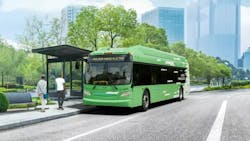BAE Systems next-generation propulsion systems to be included in New Flyer hybrid-electric buses
New Flyer of America Inc. (New Flyer), a subsidiary of NFI Group Inc., has added BAE Systems’ Gen3 modular power control system (MPCS) and traction motor as an available powertrain option for Xcelsior hybrid-electric transit buses built from model year 2025 onward.
The next-generation system from BAE Systems is smaller and lighter than the previous generation product. The reduced number of components, cables and connections in the MPCS works in conjunction with hardware and software improvements to provide more reliability, more efficiency and a better total cost of ownership over the life of the bus.
The system features two energy storage options, including a 12-year-life ultracapacitor or a part-time electric, geofencing-capable solution, all supported by BAE Systems’ extensive North American service network. BAE Systems’ Gen3 system represents progress gained across more than 27 years of innovation and improvement, built off lessons learned from across 18,000 fielded electric propulsion systems.
“At New Flyer, we are working continuously to integrate new parts and technologies and with each new inclusion we aim to strike a balance between products that are innovative and reliable,” said Ian Macpherson, vice president, engineering services, New Flyer and MCI. “We believe offering this new MPCS option is an important next step in our continuing mission to provide our customers with a more reliable, efficient and sustainable product.”
“Our next-generation electric drive system harnesses our commitment to continued innovation, enhancing the proven benefits of hybrid-electric technology in transit,” said Rob Dykema, senior director of North American transit accounts for power and propulsion solutions at BAE Systems. “This system improves hybrid-electric bus efficiency, lowering fuel use and emissions to advance sustainable public transportation.”
New Flyer has a wide variety of propulsion options across its Xcelsior family of heavy-duty transit buses, including battery-electric, fuel cell-electric and hybrid-electric options. Hybrid-electric vehicles can often serve as a low-emission steppingstone for agencies before they transition to zero-emission options. The implementation of these vehicles allows time for necessary support elements, such as infrastructure, to be implemented while still immediately reducing an agency’s greenhouse gas contributions.
“New Flyer understands that our position as a leader in sustainable transit makes it necessary for us to meet communities where they are as they work towards their emission reduction goals,” said Jennifer McNeill, vice president, public sector sales and marketing, New Flyer and MCI. “For many agencies, hybrid-electric buses are the option best suited to their current circumstances and a first step towards fleet decarbonization.”
